
# 273
February 28, 2007
In this issue:
UNITED NATIONS DEVELOPMENT PROGRAMME (UNDP)
- Kori Udovicki joins UNDP as Director of Bureau for Europe and the Commonwealth of Independent States
- The European Union Provides Half a Million Euros for Parliament Support Project
- The Leadership Development for Results Seminar gave new impulse in responding to HIV/AIDS epidemic in the Kyrgyz Republic
- More than 100 examples of practical activity have been received from different organizations for the ILN/CARNet
- Kyrgyz Border Guards, Customs and Police Inspectors Trained in Document Examination and Visa Security
- Regional Conference Discussed Implementation of the European Union’s Integrated Border Management Concept in Central Asia
UNITED NATIONS CHILDREN’S FUND (UNICEF)
- Real Lives in ‘the Magic Journey’
UNITED NATIONS DEVELOPMENT PROGRAMME (UNDP)
Kori Udovicki joins UNDP as Director of Bureau for Europe and the Commonwealth of Independent States
 UNITED NATIONS, 1 February 2007 - Today, Kori Udovicki assumes her responsibilities as an Assistant Secretary-General, Assistant Administrator of UNDP and Director of the Regional Bureau for Europe and Commonwealth of Independent States (CIS). UNITED NATIONS, 1 February 2007 - Today, Kori Udovicki assumes her responsibilities as an Assistant Secretary-General, Assistant Administrator of UNDP and Director of the Regional Bureau for Europe and Commonwealth of Independent States (CIS).
“Kori Udovicki is bringing to UNDP an impressive blend of work experience from the non-governmental sector, government institutions, and from the International Monetary Fund,” said Kemal Dervi?, UNDP Administrator.
Udovicki has held several senior management positions in the Government of the Republic of Serbia. From July 2003 to March 2004 she served as Governor of the National Bank of Serbia. Before that, from June 2002 to July 2003, she was the country’s Minister of Energy and Mines. Prior to those appointments, from 2001, Udovicki worked as a Special Adviser to the Minister of Finance and Economy.
Udovicki also has strong international experience, including work as an International Monetary Fund economist focusing on the former Yugoslavia, Bosnia and Herzegovina, Zimbabwe and Mozambique.
“I cherish the challenge of joining the United Nations system at a time when the organization is working to re-craft and realign itself to a new and evolving global order," said Udovicki of her appointment. "UNDP in Europe and the CIS is well positioned to help the less advanced countries learn from the complex experiences of the ones more advanced in the transition process. Our aim is to put the lessons we learn in the region to use in enhancing the world's capacity to accelerate development."
Most recently, Udovicki has been serving as President of the Center for Advanced Economic Studies, a Belgrade-based non-governmental organization working to advance economic knowledge in Southeast Europe.
Udovicki holds a Ph.D. and a M.Phil. in Economics, both from Yale University. In her new position, she succeeds Kalman Mizsei, who served as the Regional Director of the Regional Bureau for Europe and CIS between 2001 and 2006.
For additional information please contact: in Bratislava, Zoran Stevanovic, or +421 2 59337 428; or in Moscow, Snizhana Kolomiiets, or + 7 501 414 0835 or in New York, Stanislav Saling, or +1 212 906 5296
The European Union Provides Half a Million Euros for Parliament Support Project
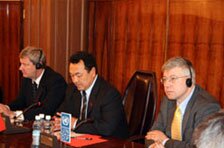 Bishkek, 5 February 2007 - The current political situation in the country demands actions that result in improved effectiveness and increased accountability of the Parliament. Its role should be as an agent of change, implementing positive changes that improve the lives of all people in the country. Bishkek, 5 February 2007 - The current political situation in the country demands actions that result in improved effectiveness and increased accountability of the Parliament. Its role should be as an agent of change, implementing positive changes that improve the lives of all people in the country.
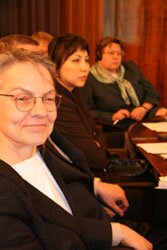 One initiative that is aimed to contribute to the law making process of the Kyrgyz Parliament is the Half a Million Euros Project on Parliamentary Reform that is funded by the European Union and is being implemented by United Nations Development Project. This project has the mission to improve the legislative process and thereby enhance the quality of laws that are being ratified. Ultimately, a more effective Parliament will contribute toward a stabilization of political situation in Kyrgyzstan. The important essence of the project is captured in its long name: “Support to improved transparency in the decision-making process and institutional strengthening of the Kyrgyz Parliament.” One initiative that is aimed to contribute to the law making process of the Kyrgyz Parliament is the Half a Million Euros Project on Parliamentary Reform that is funded by the European Union and is being implemented by United Nations Development Project. This project has the mission to improve the legislative process and thereby enhance the quality of laws that are being ratified. Ultimately, a more effective Parliament will contribute toward a stabilization of political situation in Kyrgyzstan. The important essence of the project is captured in its long name: “Support to improved transparency in the decision-making process and institutional strengthening of the Kyrgyz Parliament.”
“2007 is a very important year for the European Union. We welcomed two new members - Bulgaria and Romania. The borders came closer and the cooperation becomes closer as well. Everybody realizes it. In June we will present the strategic document which will define further EU relationships with the countries of Central Asia and, obviously, Kyrgyz Republic. The main basis for cooperation is the 1999 agreement, the so-called “Partnership and Cooperation Agreement” which among other guarantees contacts with European Parliament”, Said Adriaan van der Meer, Ambassador, Head of the EC delegation to Kazakhstan, Kyrgyzstan and Tajikistan, at the launch of the project in Jegorku Kenesh on 2d February.
“Parliament is the core of every democracy, “stressed Ambassador Van der Meer, “This project will help to improve the quality of legislative drafting and facilitate the institutional strengthening of the Kyrgyz Parliament. It will also assist with enhancing the transparency of political decision making. We are happy to share European Parliament’s know-how and best practices. This joint project on parliamentary reform is a sign of solidarity of the people of EU with Kyrgyz people.”
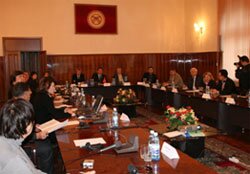 It is expected that “Support to improve transparency in the decision-making process and institutional strengthening of the Kyrgyz Parliament” project will assist the members of Parliament with gaining better communications skills which, in terms, will increase openness and transparency of parliamentary decision making and help to diffuse existing common prejudice about “dirty politicians” thus introducing more objectivity into the Parliament-public relationship. The Project is also expected to improve working relations among different governmental institutions and different branches of government by simplifying legal drafting through computerized infrastructure and standardization of procedures. Another idea is to achieve a greater harmony in legislation in general in the context of bringing existing legislation with the amended constitution. All these measures will contribute to the establishment of “Rule of Law” (Etat de Droit) that implies that every citizen is ensured with fair justice, which is the ultimate goal of every legal system. It is expected that “Support to improve transparency in the decision-making process and institutional strengthening of the Kyrgyz Parliament” project will assist the members of Parliament with gaining better communications skills which, in terms, will increase openness and transparency of parliamentary decision making and help to diffuse existing common prejudice about “dirty politicians” thus introducing more objectivity into the Parliament-public relationship. The Project is also expected to improve working relations among different governmental institutions and different branches of government by simplifying legal drafting through computerized infrastructure and standardization of procedures. Another idea is to achieve a greater harmony in legislation in general in the context of bringing existing legislation with the amended constitution. All these measures will contribute to the establishment of “Rule of Law” (Etat de Droit) that implies that every citizen is ensured with fair justice, which is the ultimate goal of every legal system.
“We are very excited about this opportunity. We feel that the Project will enable the Parliament to facilitate the solution for various economic and political development issues via establishing a political dialogue with the civil society”, said Kubanychbek Isabekov, Vice-Speaker of Jogorku Kenesh.
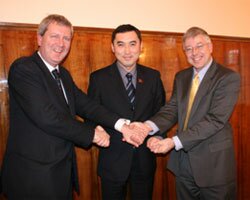 “The Project on Parliamentary reform will also help to increase parliamentary capacity regarding expertise of the national budget, analysis of budget expenditures and improvement of control function. About 48 laws have to be brought in line with the new Constitution. Therefore, the EU/UNDP Project is very important for the parliament, “he stated. “The Project on Parliamentary reform will also help to increase parliamentary capacity regarding expertise of the national budget, analysis of budget expenditures and improvement of control function. About 48 laws have to be brought in line with the new Constitution. Therefore, the EU/UNDP Project is very important for the parliament, “he stated.
Neal Walker, UN Resident Coordinator, summarized the importance of the Project: “It is apparent that there is an urgent need to enhance Parliament’s law-making capacities, provide more involvement of citizens into the process of decision making and legislation, and increase transparency of the decision-making in the Parliament, thus making citizens the important part of it. The UNDP considers itself a critical partner in helping the parliament to achieve the objectives.“
For more information, please contact Vasilina Brazhko, Communication Officer of UNDP in Kyrgyzstan at + 996 (312) 61-12- 13 ext. 222 or by e-mail: or Janna McManus, National Communications Specialist for EU/UNDP Parliament Project at +996 (503) 277964
The Leadership Development for Results Seminar gave new impulse in responding to HIV/AIDS epidemic in the Kyrgyz Republic
 The UNDP Leadership Development Programme in the Kyrgyz Republic The UNDP Leadership Development Programme in the Kyrgyz Republic
The United Nations Development Programme alongside with UNAIDS and UN system was identified as the main partner in institutional capacity building in global efforts to reduce the epidemic prevalence. The UNDP corporate priority areas in HIV/AIDS prevention are leadership and institutional development, governance of HIV/AIDS responses, advocacy and awareness raising in HIV/AIDS prevention. Building leadership capacities of leaders, organizations and communities is aimed at strengthening of sustainable national response to HIV/AIDS epidemic in the country.
It is impossible to stop HIV/AIDS epidemic without support of the teams with outstanding leadership capabilities working jointly all over the country. The leaders and their teams representing state institutions, civil society and UN system organizations should work in close cooperation. The UNDP Leadership Development Programme assumes multidimensional strategic policy framework which helps all stakeholders work jointly at achieving common goals and increasing efficiency of the HIV/AIDS strategy implementation.
Having been successful in other countries, the Leadership Development Programme is now demonstrating its high results in Kyrgyzstan.
Leadership and HIV/AIDS problems in Kyrgyzstan: What is a link?
Over the past decade, the HIV/AIDS preventive programmes have been implemented in Kyrgyzstan quite actively. Many of them for example harm reduction programmes managed to succeed in achieving substantial progress, and are attracting significant donor funding today.
However we are not as successful in all our HIV prevention activities. Some interventions, for example HIV/AIDS prevention among the labor migrants, became pressing only in the past few years, and our success here is not as significant.
The State Programme on HIV/AIDS prevention in the Kyrgyz Republic for 2006 - 2010 is the integrated and complex programme which proves importance of preventive interventions within all vulnerable groups of the population. The challenge is to turn the Strategies described in the Programme into reality and to turn the Word into Action.
The UNDP Leadership Development Programme for HIV/AIDS prevention aims at elimination of the gap between the policy and actual implementation of response activities in the HIV/AIDS area, and is aimed at development and strengthening of human resources and organizational capacities of national actors in national response to HIV/AIDS epidemic.
The programme is focusing on the most difficult and problematic areas of preventive activities, putting more efforts on the areas with low interest, commitment, insufficient human and financial resources.
It is proven by the world experience that efficient leadership and human rights based approach to activities are the key elements of successful response to HIV/AIDS. Hence the major tool of UNDP leadership development programme is the Leadership for Results seminar. This seminar trains the new cohort of specialists in preventing HIV/AIDS; the specialists are highly interested, committed, and they have developed new leadership skills and qualities.
The “Leadership for Results” seminar is composed of three sessions, each session lasts three days. During the three months’ intervals between the sessions, the team participants have a chance to implement the “breakthrough initiatives” – the new interventions in the most complex and untapped areas of HIV/AIDS epidemic response.
“Leadership for results: for Kyrgyzstan free of AIDS!” 2007 seminar: first session (19-21/02/07)
“My attitude to the problem has changed drastically”
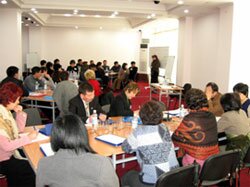 The first session of the seminar “LEADERSHIP FOR RESULTS: FOR KYRGYZSTAN FREE OF AIDS!” took place on February 19-21, 2007 in the conference-hall of the Issyk-Kul Hotel in Bishkek. More than 40 specialists representing eight ministries and institutions and relevant NGOs took part in this event. The first session of the seminar “LEADERSHIP FOR RESULTS: FOR KYRGYZSTAN FREE OF AIDS!” took place on February 19-21, 2007 in the conference-hall of the Issyk-Kul Hotel in Bishkek. More than 40 specialists representing eight ministries and institutions and relevant NGOs took part in this event.
The Seminar followed a unique methodology, which involved participants in studying the HIV/AIDS epidemic, which built partnerships and assisted the participants in directing their efforts at addressing the most vital issues. During the seminar, the theoretical parts were closely interlinked with the practical workshops; mini lectures were combined with games and exercises; video presentations provoked group discussions and debates.
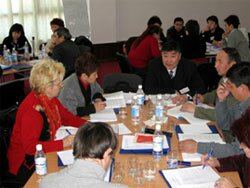 “I believe that the major advantage of this seminar was that its methodology excluded any despair in addressing complex problems, and directed the participants towards optimistic opportunities to resolve them”, shared Mr. Bulat Amanovich Sarygulov, the seminar participant representing the State Committee for Migration and Employment. “I believe that the major advantage of this seminar was that its methodology excluded any despair in addressing complex problems, and directed the participants towards optimistic opportunities to resolve them”, shared Mr. Bulat Amanovich Sarygulov, the seminar participant representing the State Committee for Migration and Employment.
Leader teams and “breakthrough initiatives”:
-
“Vulnerable groups and HIV/AIDS: cooperation of AIDS service NGOs and the police services”, see the detailed information on group performance by following this link.
“It was a really breakthrough day”, - shared Ms. Kulzhan Satarova, the workshop participant representing “Sotsium” Public Association regarding the third day of the workshop. “I am very satisfied and can share that earlier when NGOs and police officers sat around one table to talk about pending issues, discussions were not as friendly and constructive”.
-
“Migrating population and HIV/AIDS”, see detailed information on group performance by following this link.
-
“Low income youth and HIV/AIDS”, see detailed information on group performance by following this link.
-
“Schools and youth peer-to-peer education”, see detailed information on group performance by following this link.
“In the process of participation in this leadership seminar, my attitude towards this problem has changed completely” shared Mr. Rafik Akhmetovich Nurmakhmatov representing Kara-Balta Food Industry College. “I believe that my participation in this seminar opened my eyes, now I view this problem differently”.
Leadership Development Programme Plan:
-
First seminar (3 days) February 2007
-
Breakthrough initiatives 2- 3 months;
-
Second seminar (3 days) May 2007;
-
Breakthrough initiatives 2- 3 months;
-
Third seminar (3 days) September 2007;
-
Participants continue breakthrough initiatives upon completion of the Programme.
For additional information, please, contact: Vasilina Brazhko, Communication Officer of UNDP in Kyrgyzstan at +996 (312) 61-12- 13 or by e-mail: or Janyl Rakhmanova, Programme Associate, UNDP HIV/AIDS focal Point
More than 100 examples of practical activity have been received from different organizations for the ILN/CARNet
Bishkek, 28 February 2007 - 114 examples of practical activity from all Central Asian countries were nominated for the ILN/CARNet "Best Practices Competition in Sustainable Development of Central Asian Countries". From Kyrgyzstan 31 practical activities were nominated.
Preliminary statistics allow us to see the success and depth of the competition process: it is entered by activities covering all UN Millennium Development Goals (MDGs). The examples submitted to the competition demonstrate the localization process of the global MDGs in such areas as:
-
Introduction and sustainable use of environmentally clean energy sources;
-
Mobilization of local population in the process of mitigating poverty and promoting gender equality;
-
Increasing the quality of primary education;
-
Raising public awareness of AIDS/HIV issues, etc.
In the final of the competition 3 best entries will be chosen from each country that will be awarded with the Best Practice status and cash prize. Apart from this, special nominations were initiated such as "Introduction of Renewable Alternative Energy Sources in Kyrgyzstan", "Best Practices in Sustainable development of Turkmenistan", etc.
Awarding of winners will take place from 20 to 25 March 2007 in the UNDP Offices in Central Asian countries. The Best Practices Competition in Sustainable Development of Central Asian countries is held by CARNet Digital Information Network, as part of the sub-project "Creating Information and Learning Network "Capacity-2015 in Central Asian Countries" with the UNDP Regional Center for Europe and CIS support and in partnership with the UNDP Offices in Kazakhstan, Kyrgyzstan, Tajikistan, Turkmenistan and Uzbekistan. General coordination of the competition was implemented by the UNDP Country Office in Kyrgyzstan.
By holding this competition and creating a database of the Best Practices the ILN/CARNet Information Network popularizes and supports achievement of MDGs by Central Asian countries through expanding access to innovative approaches and concrete examples of solutions to problems of sustainable development.
For additional information, please, contact: Vasilina Brazhko, Communication Officer of UNDP in Kyrgyzstan at +996 (312) 61-12- 13 or by e-mail: or Vladimir Grebnev, CARNet Regional Coordinator, Kyrgyzstan at +996 (312) 623761 or
Kyrgyz Border Guards, Customs and Police Inspectors Trained in Document Examination and Visa Security
A training course on Document Examination and Visa Security for the staff of the Border Service, the State Customs Inspectorate under the Government and the Ministry of Internal Affairs of the Kyrgyz Republic was held during February 19-23, 2007 in Bishkek.
During a five-day training session Mr. Tibor Kovacs, a trainer from the European Union, held training sessions for the border staff, customs and police officers in detecting document fraud and use of special technical equipment on document verification and examination.
Among other issues, the training covered visa policy; validity, paper production and printing of travel document and visas; biometric identification systems; and operational, forensic and technological ways to detect travel documents, as well as security features to protect visas against fraud and corruption.
The training is being organized in the framework of Border Management Programme in Central Asia (BOMCA) funded by the European Commission and implemented by UNDP.
For more information, please contact Ms. Asel Sekimova, BOMCA/CADAP Media and Events Specialist, by phone: 61 20 18/19 or e-mail:
Regional Conference Discussed Implementation of the European Union’s Integrated Border Management Concept in Central Asia
A two-day Regional Conference to discuss implementation of the European Union’s Integrated Border Management (IBM) concept in Central Asia was held during 27-28 February in Bishkek.
The Conference has been organized in the framework of the Border Management Programme in Central Asia (BOMCA) funded by the European Union and implemented by UNDP.
To promote the IBM approach, two projects, “Legal Assistance” and “Training for Border Staff” have been implemented by the International Centre for Migration Policy Development (ICMPD) under the BOMCA Programme.
Trainings were conducted in IBM methodologies for commanders of border agencies, and basic skills trainings for border agencies’ staff were provided in pilot regions.
Trainers from the European Union coached local trainers, who, in their turn, provided training sessions for the border service staff afterwards.
Approximately eight hundred border guards, customs and police officers were trained in Tajikistan in 2005. In Kyrgyzstan, IBM trainings were conducted during September 2006–January 2007 at 10 border crossing points (auto, air, railway) along the perimeter of the Kyrgyz border.
About two hundred and fifty border agencies’ staff from 18 border crossing points, 23 customs stations, as well as personnel of regional veterinary, phytosanitary and sanitary departments participated in trainings. The geographical area of IBM trainings embraced six oblasts of Kyrgyzstan.
Other trainings focused on intelligence sharing among authorities at borders, risk profiling and search techniques, border control, visa management and identification of forged documents to improve border controller capacities.
The participants of the Conference discussed the status quo in the CA countries in the field of IBM, training work plans and future perspectives of the national strategies.
ICMPD also presented its Handbook for Implementation of the EU IBM concept in Central Asia with practical examples of IBM implementation and guidance for establishment of national IBM strategies and action plans by all agencies involved in border management, e.g. border guards, customs, phytosanitary and veterinary inspections.
For more information, please contact Ms. Asel Sekimova, BOMCA/CADAP Media and Events Specialist, by phone: 61 20 18/19 or e-mail:
UNITED NATIONS CHILDREN’S FUND (UNICEF)
Real Lives in ‘the Magic Journey’
 “It is Muktar speaking. Can I speak to Aktan or Akylay?” asked a small boy ringing the children’s studio of the Kyrgyz National Broadcasting Company. Lira Aitembetova, a producer with the youth studio, offered her help as both Aktan and Akylay, the main characters in the daily “Keremet Koch” animation programme, “were out in one of the magic countries”. Every day, Lira and her staff try to answer dozens of calls from young viewers who need help with tasks given by Aktan and Akylay. “It is Muktar speaking. Can I speak to Aktan or Akylay?” asked a small boy ringing the children’s studio of the Kyrgyz National Broadcasting Company. Lira Aitembetova, a producer with the youth studio, offered her help as both Aktan and Akylay, the main characters in the daily “Keremet Koch” animation programme, “were out in one of the magic countries”. Every day, Lira and her staff try to answer dozens of calls from young viewers who need help with tasks given by Aktan and Akylay.
‘Keremet Koch – The Magic Journey’ is an animation project for young children in Kyrgyzstan. Every day children and their parents live out the adventures of the main characters and learn new skills such as preparing for school, coping with life’s difficulties, and protecting themselves from global scourges like HIV/AIDS and avian flu. At the end of each episode young people attentively listen to the task they have been set and the next day are busy with it.
 Children from remote areas of Kyrgyzstan together with their parents and elder siblings regularly mail their stories, wishes, and questions to the programme and attach pictures and articles made of coloured paper and other materials depicting what they have learned from the cartoons. “Yesterday it snowed heavily. I don’t know how to go out and go to school,” complained Aigerim from the Chon Alay region at an altitude of more than 3,000 meters.. Elza from Issykkul region was sick with influenza and sought advice in her letter with a small drawing. Kalmurza from the same region asked to be sent school books on mathematics and the Kyrgyz language. Abdimalik from another part of the republic – Osh region - wondered: “Aktan and Akylay, how old are you? I want to make friends with you. Do you have a family? We are five.” Nurbek, an 11-year-old boy, wrote a request from his younger sister: “Would you please show us how to make a doll?” Children from remote areas of Kyrgyzstan together with their parents and elder siblings regularly mail their stories, wishes, and questions to the programme and attach pictures and articles made of coloured paper and other materials depicting what they have learned from the cartoons. “Yesterday it snowed heavily. I don’t know how to go out and go to school,” complained Aigerim from the Chon Alay region at an altitude of more than 3,000 meters.. Elza from Issykkul region was sick with influenza and sought advice in her letter with a small drawing. Kalmurza from the same region asked to be sent school books on mathematics and the Kyrgyz language. Abdimalik from another part of the republic – Osh region - wondered: “Aktan and Akylay, how old are you? I want to make friends with you. Do you have a family? We are five.” Nurbek, an 11-year-old boy, wrote a request from his younger sister: “Would you please show us how to make a doll?”
During the three months that it has been on air, the animation project “Keremet Koch” has won the love of all Kyrgyzstan leaving nobody untouched. It is one of the most popular programmes on national television. Parents are happy to see their children imitating the good practices found in the programmes, and some even learn new things for themselves. The programme’s popularity means some people even record the cartoons from TV and try to secretly sell pirate copies. Older children offer their help in developing scenarios. Aisha Aitikeeva, a 13- year-old schoolgirl from Bishkek, composed a fairytale about how ‘Vitamin Khan’ fought his neighbouring country ‘Microbe’ and saved the peoples of both countries.
The project is supported by UNICEF in partnership with national and international organizations. “We plan to further develop the concept. This year, the main characters from the cartoons will come to kindergartens and early childhood development centres in the form of puppets to establish new creative opportunities for children. And every child who sent a letter will get a reply. It is an open window to share information on key family practices on health, nutrition and child development as well as helping children to become better prepared for entering school” said Timothy Schaffter, UNICEF Representative in Kyrgyzstan.
‘Keremet Koch’ is part of UNICEF’s Behaviour Change Communication Programme that aims to help parents from remote and poor areas with no kindergarten facilities to stimulate the learning and development of their pre-school children.
|

